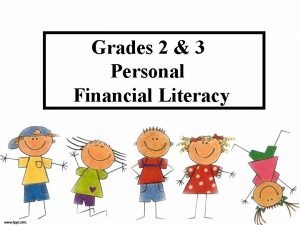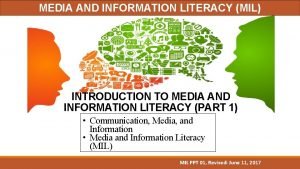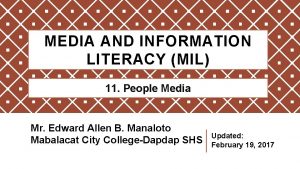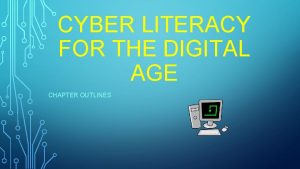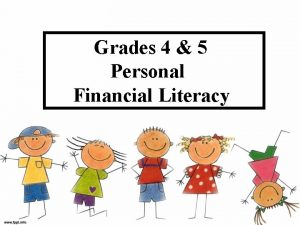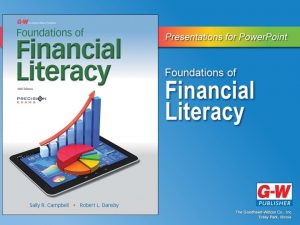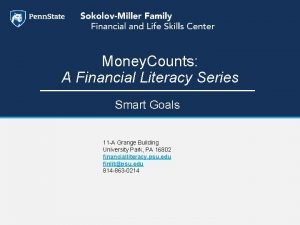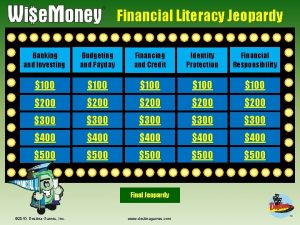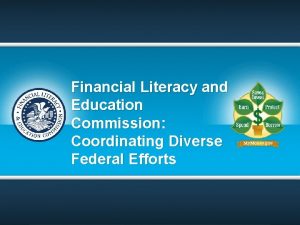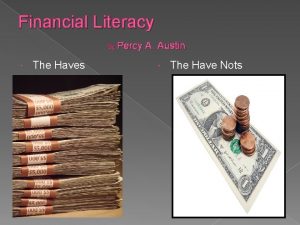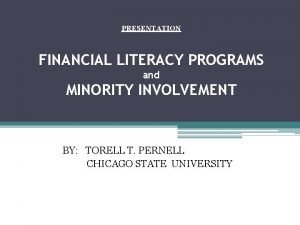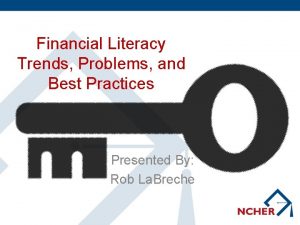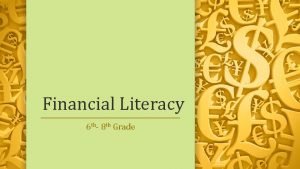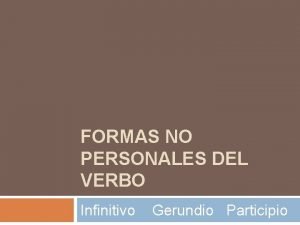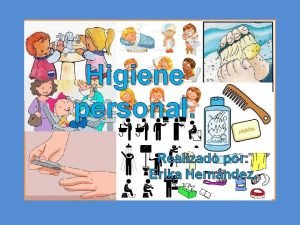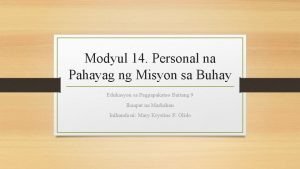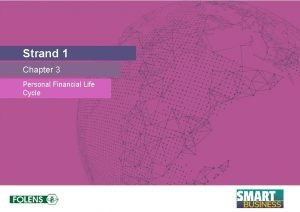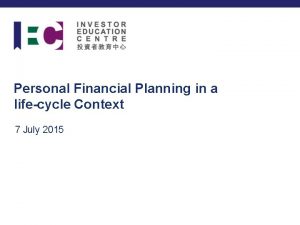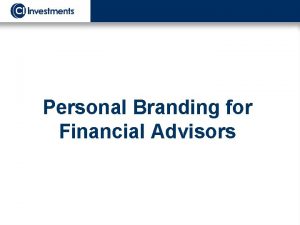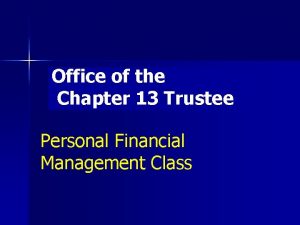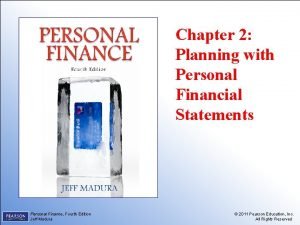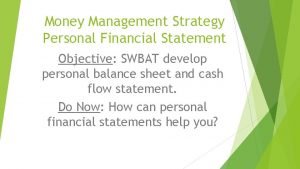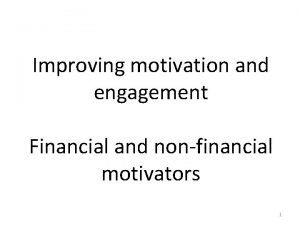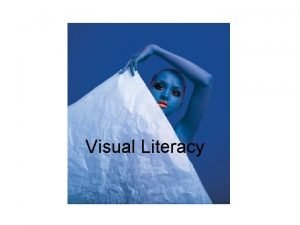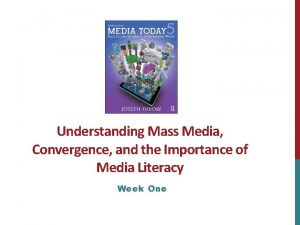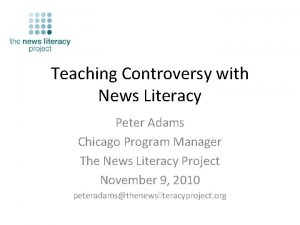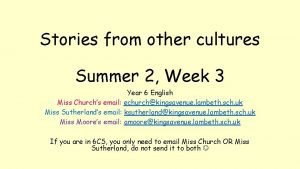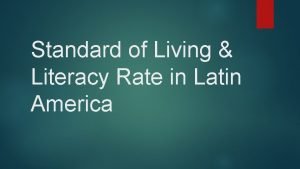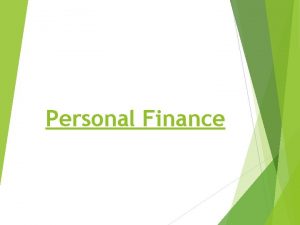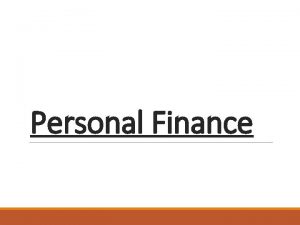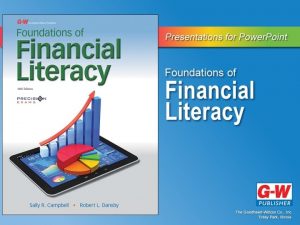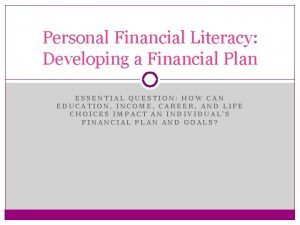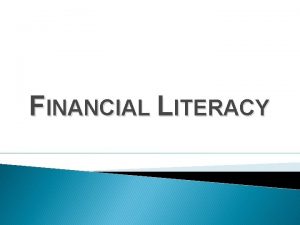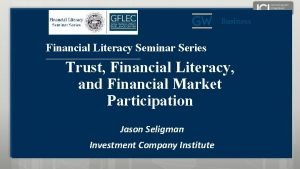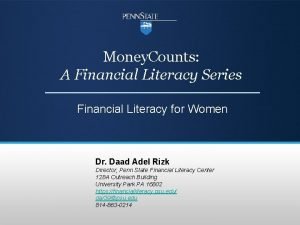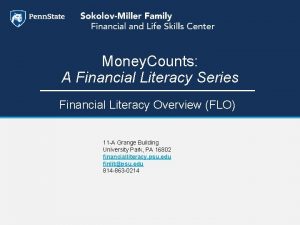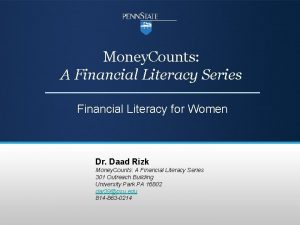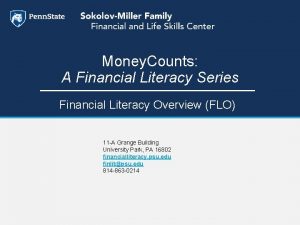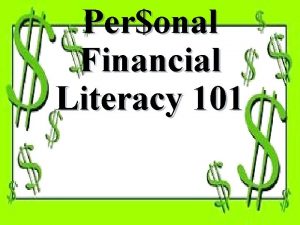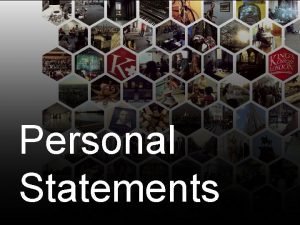Personal Financial Literacy Financial Literacy Financial Personal Literacy










































- Slides: 42

Personal Financial Literacy

Financial Literacy Financial Personal Literacy Knowledge and skills which characterize economic decision-making including a basic understanding of saving, credit, checking, investing, budgeting and other personal decisions involving money. A lack of financial literacy could lead to poor economic decisions and avoidable challenges and obstacles.

Setting Priorities One of the most important parts of financial literacy is one’s ability to set priorities: What do I want? Does it make sense now? What are the trade-offs? Who can help me make these decisions? What are my goals?


Financial Goals Short-term goals: Desired achievements and financial decisions in the next year? Middle-term goals: Desired achievements and financial decisions in the next 1 -5 years? Long term goals Desired achievements and financial decisions beyond 5 years from now?

Saving & Investing What can I do with my money? Spend it! Take it to the bank… Savings Accounts Checking Accounts Certificate of Deposit (CD) Safety Deposits Note: Consider the fees, charges, interest rates and services provided when choosing a bank to use. All financial institutions are not the same!

Saving & Investing Your Money: Stocks: Shares of a company Gives individual people “ownership” of a business or product for profit Bonds: Note of money loaned with guaranteed pay & interest Other Ways of Investing Real Estate Owning a business

Major Decisions Housing Rent vs. Owning: What are the benefits and consequences of each option? Job/Income Can you balance a part-time job with other responsibilities? What are your long term options? Cars The second you drive off the lot in a car it decreases in value. Is it worth it? College Have you considered applying for scholarships and financial aid?

Housing (Renting vs. Owning) Renting Borrowing space Not a long-term investment Only or best option available to some based on income Good for those that move around a lot Owner of facility required to take care of problems that may come up Owning Eventually the property is yours Long-term investment that may produce a profit Permanent settlement You are required to take care of any problems Mortgage must become part of budget

Working Part-Time? YES Ability to earn extra income to support family or save for later Allows a young person to learn/gain: Money management Time management Hard/soft skills Sense of challenge & accomplishment NO Interferes with any academic focus Difficult to balance with extra-curricular activities Limits other outside opportunities There will be plenty of time for working as an adult!

Cars/Transportation Purchasing Consider your needs, available money (what you can afford per month), and the best time to buy a car (last week of the month) Selling Learn about Kelly’s Blue Book (this resource will determine the value of a car) Other Transportation Can you take public transportation or carpool with a friend? Is biking an option?

Financial Aid Two types of financial aid is available Need based: Because of economic status or limited resources Merit based: Because of academic, athletic, or activity based excellence Available Never Resources assume that a family is not eligible for financial aid; speak to counselors, educations, or schools for assistance

Budgeting & Spending: Needs vs. Wants Needs are items required for survival while wants are items that we desire Short term, middle term, and long term goals Choices: Prioritize What will you do? your financial goals What resources will help you achieve your goals? Support systems: Parents and/or school? Three E’s: Enrolled, Employed, or Enlisted? Career Possibilities… What interests you?

Budgeting & Spending • Budget: Plan for spending, collecting, and managing money – Fixed expenses – stay the same in a given time period – Variable expenses – change over time • Borrowing money – Consider the ideas of Loans (amount of money borrowed) and Interest (the cost of borrowing money) – Build “good credit” by paying your bills on time, taking advantage of credit cards, and establish a good history of financial decision making

Table 1. 2016 Taxable Income Brackets and Rates (Estimate) Rate Single Filers Married Joint Filers Head of Household Filers 10% $0 to $9, 275 $0 to $18, 550 $0 to $13, 250 15% $9, 275 to $37, 650 $18, 550 to $75, 300 $13, 250 to $50, 400 25% $37, 650 to $91, 150 $75, 300 to $151, 900 $50, 400 to $130, 150 28% $91, 150 to $190, 150 $151, 900 to $231, 450 $130, 150 to $210, 800 33% $190, 150 to $413, 350 $231, 450 to $413, 350 $210, 800 to $413, 350 35% $413, 350 to $415, 050 $413, 350 to $466, 950 $413, 350 to $441, 000 $466, 950+ $441, 000+ 39. 6% $415, 050+

Insurance & Taxes

Insurance: Basic Definitions Insurance – a means of guaranteeing your financial protection against various risks in exchange for relatively small payment, you gain protection against potentially large loss (things you can’t pay out of pocket) Insurance policy – a written contract detailing what an insurance company will cover, how much it will pay, and how much you will pay Premium – the amount you pay for policy Coverage limit – the maximum amount insurance company will pay if you file a claim Deductible – the amount of a loss you must pay out of your own pocket before insurance company pays rest

Types of Insurance 1. Health Pays medical bills when you or family becomes sick, injured Often get it through employer Obamacare: parents’ insurance covers you until 26 2. Property 3. House, and everything in it Fire, theft, tornado (flood often extra) Good idea to take pictures of your stuff Life Financial support for people who depend on you in the event of your death

Types Of Insurance 4. Disability 5. Liability 6. Protects your earning power by paying you income when illness or injury prevents you from working Protects you in case you’re legally responsible to unintentionally injuring someone or damaging another’s property Covers legal fees and court cases Auto Premiums higher for teenagers, males under 25 What else matters? Type of car, safety features, how often you drive, location If you get into accident or get speeding ticket, premium goes up

How To Keep Insurance Costs Down 1. Choose reasonable coverage limit 2. Go for a higher deductible 3. Shop for insurance policies like any other purchase 4. Look for ways to lower your risk 5. Use same company from same agent or company

Where To Keep What Keep in your files: Current insurance policies Premium statements Medical bills Inventory of personal assets Documentation of any claims you’ve filed Keep Auto In Wallet: insurance ID card Health insurance card

Taxes Four 1. Federal Income Tax 2. Employers withhold this tax from employees as payroll deductions and then send tax to IRS A person who owns their own business pays a selfemployment tax State Income Tax 3. Common Deductions On A Pay Stub Also collected by employer; sent to N. C. Dept. of Revenue Social Security Tax Provides small income and other services to the elderly, disabled, and orphans

Taxes 4. Medicare Provides medical insurance to elderly and some disabled To gather funds for S. S. and Medicare, employee earnings are taxed (FICA taxes) Deducted from employee’s wages each pay period Employers send deductions to the S. S. Administration along with a matching amount paid by employer

Other Tax Terms Gross vs. Net Income Gross – total amount of income from your wages or before any payroll deductions Net – income after employer has deducted taxes from your gross income (your “take-home pay”) This is what you’ll be able to deposit and use for your budget W-4 You can’t avoid paying taxes, but you can have some control over how much you have withheld from your check You fill it out when you start your job Can choose to pay more taxes throughout the year, or wait and pay more at tax time

More Taxes? ? !!! Estate taxes – taxes on the inherited property and money after a person dies Gift Taxes – paid on gifts of more than $12, 000 Excise taxes – specific items the govt. closely regulates Gas, oil, liquor, tobacco, guns, airline tickets Sometimes called “hidden taxes” because they’re included in price Customs duties – paid on goods purchased outside of U. S. and brought into the country Tariffs – placed on imports Lottery winnings, game-show prizes (it’s all income) And…don’t forget sales (state) and property (local)

Credit

The Basics of Credit Principal -- the money you are actually lent Interest -- the amount you pay to use someone else’s $

The Cost Of Using Credit Annual Percentage Rate (APR) – tells you the cost of the loan per year as a % of the amount borrowed Annual Fee – a yearly charge for the privilege of using credit Credit Limit – max. amount of credit a lender will extend to a customer Finance Charge – the actual dollar cost of using credit to maintain a balance Origination Fee – charge for setting up the loan (homes) Loan Term – the length of time you have to pay off the loan Grace Period – the time you have before you start accumulating interest

The Cost of Using Credit Late Fee – penalty for making a payment after the due date Default – failing to pay back what you owe

The Rewards of Credit 1. Convenience 2. Buy something you couldn’t otherwise afford to pay for all at once (house, car, tuition) Easier and safer than carrying cash Buy items on Internet Protection Easier to get a refund than with cash 3. Emergencies 4. Opportunity to build credit using credit responsibly builds your credit history, makes it easier to get more credit when you need it later

The Rewards of Credit 5. Quicker Gratification Don’t have to wait until you’ve saved up $ for major purchase 6. Special Offers Deals that allow you to buy an item now, but not have to make payments for a year 7. Bonuses Frequent flyer miles; build up points, get a flight for free “Earn cash back”

Risks of Credit 1. Interest 2. Automatically makes item more expensive than cash purchase Overspending People often use credit to live beyond their means Buy items they can’t afford, build up debt Gets harder and harder to pay the balance

Risks of Credit 3. Debt 4. If unable to pay your debt, lenders (creditors) can take you to court and foreclose your property. Identity Theft When someone uses your personal info w/out your permission to commit fraud or other crimes. Giving out credit card # puts you at risk for someone stealing info to run up debts in your name.

Keeping Up With Credit Report – a record of your personal financial transactions (credit history) Lenders look at these to see how well you’ve managed your $ Use them to decide if they should lend you $ Credit Score – the number that reflects your creditworthiness When you apply for credit, lenders want to know their risk Score changes over time as your financial situation changes (new job, promotion or raise, taking on big expenses)

Keeping Up With Credit Hurting your credit history and credit score: Making late payments (always pay balance on time) Bouncing checks Having a lot of credit cards and loans Maintaining a high balance Lenders don’t like to see you spend $ up to your credit limit Changing Lenders cards frequently like to see long-term relationship between you and credit-card companies

Keeping Up With Credit Why Bad does your credit score matter? credit score could cause you to not get approved to borrow $ Could even prevent you from getting a job or getting married People like to see you’re financially reliable

Credit vs. Debit Credit Way (cards) to pay for items without putting money up front Not required to pay each month Minimum monthly payment; failure to pay off will result in interest Seen as necessary for major purchases (car, home, college, etc) “Good credit” necessary to prove to lenders you will pay over time Debit Way to pay for items without using paper money (do not need to carry money around with you) Comes directly out of your checking or savings account If you are not organized, it is easy to overuse without keeping track of expenses

Identity Theft Why is it bad? People have to pay for $ spent illegally Could take months or years to pay off debt or become financially stable again Could lose job opportunities Could be turned down for loans Could be arrested for crimes you didn’t commit

Identity Theft Identity 1. 2. 3. 4. 5. 6. 7. thieves do the following: Open new credit card accounts in your name Forge your signature on blank checks or authorize electronic transfers File bankruptcy in your name Take out loans in your name Get ID issued in your name, but with their picture Give your name to police during an arrest Change billing address on your credit card account

Identity Theft Ways People Accidentally Give Thieves Access To Identity: 1. 2. 3. 4. 5. 6. “Dumpster Diving” “Skimming” “Pretexting” and “Verification” “Phishing” “Freeware” “Spyware”


Questions for Review Why are personal financial literacy skills important? What factors should be included when saving, budgeting, investing, and spending? At this point in your life, what are your short-term, middle-term, and long-term financial goals? What is the difference between credit and debit? How does this impact our financial history? What factors impact major decisions?
 Pfl math
Pfl math Media literacy vs information literacy
Media literacy vs information literacy Introduction to mil
Introduction to mil What are the limitations of people as media
What are the limitations of people as media Cyber literacy and digital literacy
Cyber literacy and digital literacy Bhartiya model of financial literacy
Bhartiya model of financial literacy Tariffs grade 12
Tariffs grade 12 Till slip maths lit
Till slip maths lit 5th grade financial literacy teks
5th grade financial literacy teks Chapter 1 financial literacy basics
Chapter 1 financial literacy basics Smart goals financial literacy
Smart goals financial literacy Financial literacy jeopardy
Financial literacy jeopardy Financial literacy and education commission
Financial literacy and education commission Pshe financial literacy
Pshe financial literacy Financial literacy grade 9
Financial literacy grade 9 Financial literacy austin
Financial literacy austin Financial literacy around the world
Financial literacy around the world Needs vs wants financial literacy
Needs vs wants financial literacy Financial literacy at minority serving institutions
Financial literacy at minority serving institutions Pisa financial literacy
Pisa financial literacy Financial literacy trends
Financial literacy trends Grade 5 financial literacy
Grade 5 financial literacy Financial literacy and stock market participation
Financial literacy and stock market participation Next generation personal finance standards
Next generation personal finance standards Oraciones infinitivo gerundio y participio
Oraciones infinitivo gerundio y participio Higiene personal
Higiene personal Ang aking personal na pahayag na layunin sa buhay
Ang aking personal na pahayag na layunin sa buhay Personal life cycle finance
Personal life cycle finance Personal financial planning life cycle
Personal financial planning life cycle Personal branding for financial advisors
Personal branding for financial advisors Chapter 13 personal financial management course
Chapter 13 personal financial management course Chapter 2 personal financial planning answers
Chapter 2 personal financial planning answers Personal statement of financial position
Personal statement of financial position Examples of non financial methods of motivation
Examples of non financial methods of motivation National literacy and numeracy learning progressions
National literacy and numeracy learning progressions Offer and demand gaze
Offer and demand gaze Media literate person
Media literate person Thoughtful literacy
Thoughtful literacy Literacy numeracy framework
Literacy numeracy framework Peter adams news literacy project
Peter adams news literacy project Stages of literacy development
Stages of literacy development Zahra literacy shed
Zahra literacy shed Literacy rates in south america
Literacy rates in south america
